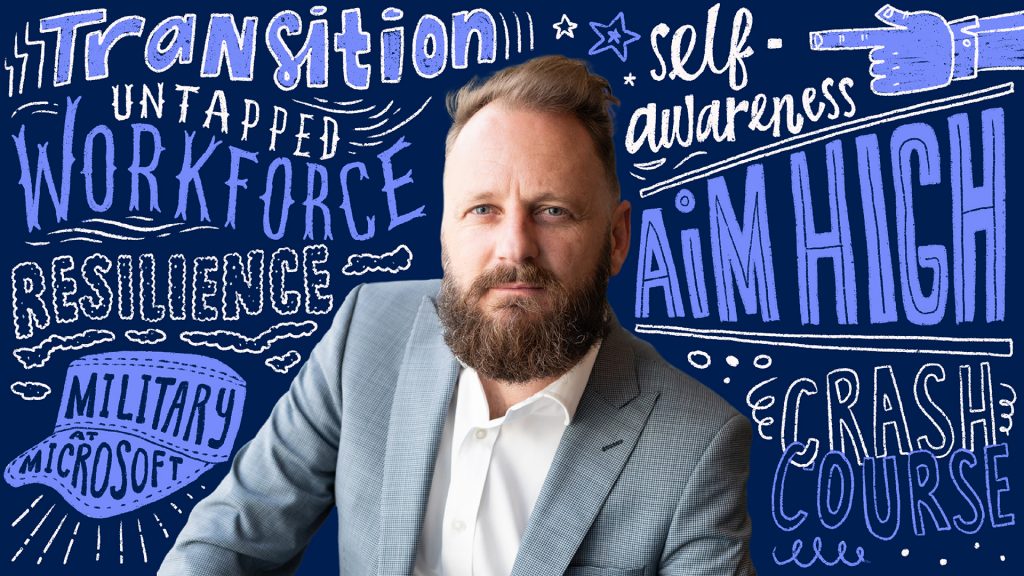
“I learned that your mind will give up well before your body does”: Jimmy Kerr on leadership, limit-pushing and bringing veterans to the tech world
Growing up in New Zealand in the 1980s, Jimmy Kerr had two dreams. He wanted to be a firefighter and he wanted to be an architect. And in a funny way, he became both.
In his 13 years with the New Zealand Defence Force, including a one-year secondment to a United Nations peacekeeping mission on the Lebanese–Israeli border, Jimmy put out more than his share of fires. Now, leading the launch of a new Microsoft datacenter region in New Zealand, he is helping to architect a project that will empower Microsoft customers and partners across the country to do amazing things.
Jimmy’s trajectory from the armed forces to a life in tech might seem unlikely to some of his fellow soldiers. But he says the journey has been an incredibly positive one – which is why he’s working to clear the same path for those who come after him.
A crash course in leadership
“Military-trained people don’t always naturally see themselves in a technology environment,” says Jimmy. “In fact, a lot of people in my situation tend to move to the public sector because it feels more comfortable.”
Yet, as he explains, many of the skills he acquired in the army – like leading a team – have been incredibly useful to him at Microsoft.
“Military training was a true apprenticeship in leadership,” he says, remembering one activity from his time in officer training camp. “It was called Exercise Nemesis, and the name sort of says it all. Having spent two weeks on the field in a normal exercise, we’d be coming back to the camp in trucks and looking forward to our first hot showers in a fortnight.
“But then, all of a sudden, we’d get put on an aircraft hangar and sent to complete a four -day escape and evasion exercise, during which I don’t think we got more than 10 hours of sleep altogether.
It was cold, we were hungry and everyone was unhappy. Yet, we had to motivate our teams to keep going. That takes a lot of self-awareness. You have to learn how you’re going to react in certain circumstances, and where your weaknesses are, so you can surround yourself with people who counterbalance you. And that’s as true in corporate leadership as it is in the army.
“I also learned that your mind will give up well before your body does, and that lesson has changed the way I think about my personal limits and goals in my career now. Because once you push yourself to the edge, and learn that you can keep going, it does change the game.”
These lessons about resilience and driving a team through ups and downs have stood the test of time for Jimmy, who is now leading the largest-scale project in Microsoft New Zealand’s history. And they’re not the only lessons Jimmy has brought over from his years in the armed services.
Agility and adaptation
“When I began my military training, it felt like I was in a foreign world,” says Jimmy. “Even though I’d travelled through some places that were very different to New Zealand, the army felt more foreign from a cultural point of view than even China or Pakistan.”
But he assessed the situation, learned the ropes and soon became one of the 20 people out of an initial pool of 1,000 applicants to graduate from officer training. Now, Jimmy says this ability to adapt to foreign situations and figure out how to succeed in unknown environments is one of the most valuable skills he brought to his role at Microsoft.
As he explains, people who work in tech don’t tend to stay in one role forever. Whether Microsoft’s employees specialise in marketing or software engineering, they tend to wear many hats over their careers, often becoming generalists in nature. Jimmy says this is another reason why the industry is such a good fit for veterans like himself.
“If you have military experience, you’ve usually had multiple jobs in quick succession and in quite diverse areas,” he says. “I don’t think I spent more than 18 months in one job while I was in the army. By the time you become competent in one thing, it’s usually time to move on and cause chaos elsewhere.”
A perfect fit
With their resilience, teamwork skills and ability to rapidly switch courses, Jimmy believes veterans have many unique advantages in the fast-paced, rapidly evolving world of tech. But he’s not sure they – or hiring managers – always realise it.
That’s why Jimmy works to open doors for veterans like himself, who might not have imagined themselves joining the tech industry but may find it’s the perfect fit. One way he’s doing this is through the Military at Microsoft Employee Resource Group, where he has recently become co-chair of the Australia and New Zealand chapter.
So, what does he hope to achieve with the platform?
Jimmy says it’s not just about supporting veterans entering Microsoft and making sure they have the mentoring they need to succeed – though that’s an important part of it. Neither is it just about broadening the perspective of hiring managers so they better understand the value veterans can offer, though that too is key.
“Our aspirations are actually far higher,” he says. Military at Microsoft’s most ambitious goal is to expand the pool of talent, not just inside Microsoft but in the technology sector more broadly, through training and mentorship. The way Jimmy sees it, veterans offer one part of a solution to the tech skills gap facing Australia and New Zealand, and in turn, the tech industry offers them a solution to the often-fraught question of ‘what next’?
“It’s a really large, untapped but highly capable workforce,” he says. “And I don’t think that’s well understood either by the sector or the veterans themselves. Hopefully, though, we can start to change that.”








